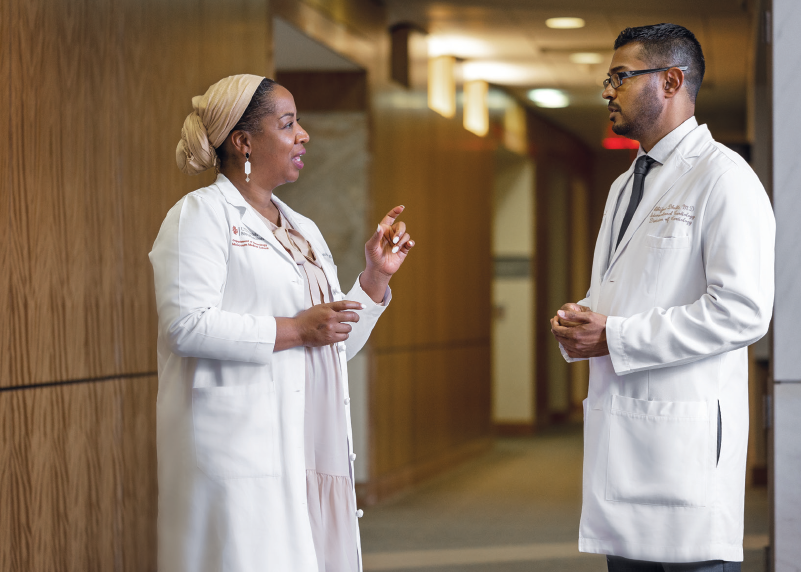Heart-Brain Program Offers a Closed-Loop Continuum of Care to Patients with PFO-Associated Stroke

Patients who suffer strokes that might be related to a hole in the heart that didn’t close properly now have a place to go to see both a neurologist and cardiologist: the Heart-Brain Program at McGovern Medical School at UTHealth Houston. The program is led by Abhijeet Dhoble, MD, professor of cardiovascular medicine and director of structural heart interventions at the medical school, and Anjail Z. Sharrief, MD, MPH, professor of neurology and director of stroke prevention at the UTHealth Houston Institute for Stroke and Cerebrovascular Disease.
Formed in 2018 by Dhoble and Nicole R. Gonzales, MD, former professor of neurology at UTHealth Houston, the program provides multidisciplinary care for patients with strokes that are potentially associated with a patent foramen ovale (PFO), a hole in the heart that failed to close properly after birth, leaving a small flap-like opening between the right and left upper chambers of the heart. That small opening can allow a blood clot to travel to the brain and cause a stroke.

Through the Heart-Brain Program, Drs. Sharrief and Dhoble provide multidisciplinary care for patients with strokes that are potentially associated with a patent foramen ovale (PFO).
“Patients prefer to be seen in a multidisciplinary fashion,” Dhoble says. Rather than giving them competing messages when we see them, we show them a comprehensive targeted plan.” Before the existence of the Heart-Brain Program, patients with PFO-associated ischemic stroke were referred for PFO closure in one of two ways. They were either referred to the UTHealth Houston stroke team for stroke evaluation and subsequently referred to the cardiology clinic for additional PFO evaluation, or they were directly referred to the cardiology clinic for PFO closure by a community physician, without any direct neurology consultation.
“The first point of contact for most of these patients, who tend to be younger, is the hospital emergency room rather than a primary care provider or cardiologist. So, historically, these patients were going home and being asked to follow up with a cardiologist or primary care physician,” Dhoble says. “They were overwhelmed with information. Some were not following up with a physician and suffered a second stroke.”
This created a need for a closed-loop system, Dhoble says, in which patients at Memorial Hermann-Texas Medical Center and other hospitals in the Houston area are directed to a single clinical setting to expedite the appropriate workup and improve shared decision-making about PFO closure among neurologists, cardiologists, and patients.
Thanks to the coordination between McGovern Medical School’s Department of Neurology and Division of Cardiovascular Medicine, both teams continue to work together three years later, seeing patients at UTPhysicians, the clinical practice of McGovern Medical School, on the second Friday of each month. Patients are also offered virtual appointments. The clinical team includes an interventional cardiologist, a stroke neurologist, neurology and cardiology fellows, advanced practice practitioners, and research coordinators.
“There are less than a handful of these programs in the U.S.,” Sharrief says. “Whether in person or virtual, the most important thing we offer our patients is combined expertise, making sure they know the latest on stroke prevention and management as the guidelines continue to evolve.”
An internal study1, which compared outcomes in patients sent to the Heart-Brain Program versus patients who underwent routine care from February 2017 to July 2020, found that the Heart-Brain group required fewer clinic visits from stroke to closure decision. According to Sharrief and Dhoble, fewer visits reduce costs, save time, and improve overall quality of care for patients. While additional work is needed to determine whether this approach improves other aspects of care and outcomes, Sharrief and Dhoble believe their preliminary findings demonstrate that a multidisciplinary patient-centered approach to the care of patients with PFO-associated ischemic stroke is the way of the future.
“The American Heart Association and others are already supportive of the idea of developing this kind of program, which promotes multidisciplinary collaboration and shared decision-making for these patients,” Sharrief says. “We’re living in the future right now, here.”
1Tariq MB, Qadri SKS, Sharrief A, Tulod K, Dhoble A, Gurung S, Jamilla Lacap M, Okpala M, Manwani B, Smalling RW, Gonzales N. Heart Brain Clinic: An Integrated Approach to Stroke Care. Neurol Clin Pract. 2023 Dec;13(6):e200206. doi: 10.1212/CPJ.0000000000200206. Epub 2023 Nov 6. PMID: 38495079; PMCID: PMC10942000.
In This Section:
Features:
- True to Our Values
- The Heart-Brain Program: A Closed-Loop Continuum of Care to Patients with PFO-Associated Stroke
- Multidisciplinary Programs Provide Convenience and a Broader View of Health to Physicians and Patients
Patient Stories:
- Alabama Woman Finally Gets a Sleep Disorder Diagnosis Through Telehealth
- Radiofrequency Ablation (RFA) for severe back pain
- Finally Getting a Good Night’s Sleep with remedē®
- Making a Difference by Participating in Huntington’s Disease Research
Research & Trials:
- Sensitizing Tumors to Radiation Therapy Using Gold Nanoparticles
- An Investigation: Th-1 Dendritic Cell Immunotherapy in Combination with Standard Chemoradiation for Adjuvant Treatment of Adult Glioblastoma
- Advances in the Diagnosis and Management of Cluster Headache
- AI-Powered Algorithms May Help Detect Unruptured Brain Aneurysms
Accolades & News:
- Department of Neurosurgery Ranks 4th in NIH Funding Among US Clinical Science Departments
- McCullough Wins Stroke Association Lecture Award
- UTMOVE Receives Distinguished Edmond J. Safra Fellowship in Movement Disorders
- Schiess Awarded UTHealth Houston President’s Scholar Award
- Burish Co-Chairs the AHS Scientific Program Committee
- Furr Stimming Named HSG Outstanding Investigator
- Lo Receives UT System STARs Award
- Burish Assumes Responsibility for Neurology Residency Training for Headache Medicine
- Morcos Named Chair of Neurosurgery











